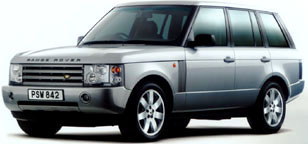|
| Land Rover Range Rover 4.4 V8 vogue auto £59995 |
spec-check |
 |
| engine |
-
4398cc
|
| power |
-
282 bhp
|
| top speed |
-
122 mph
|
| 0 - 60 mph |
-
9.6 s
|
| economy |
-
17.4 mpg
|
| range |
-
383 miles
|
| insurance |
-
Group 16
|
| cost per mile |
-
83.1 p
|
| CO2 |
-
389 g/km
|
|
Report by Graham Whyte : 英國新車網路訊息報
I once taught origami at night school but the attendance was poor and the course folded. But never mind, I have found a new subject for the summer term ?Zen and the art of differential maintenance. That should get them in.
On second thoughts, I think perhaps I'll run a course on the new Range Rover. Such a complex, sophisticated and clever vehicle requires more than a brief encounter to fully appreciate the depth of its luxury and capability. I spent a week with the vehicle and in that time learnt enough to know that it would take a month of Sundays to get to the bottom of the Range Rover story. Instead I have got about five minutes of your time and can therefore offer little more than a whistle-stop tour.
I will start with the big picture. The product of a £1 billion investment, there are insufficient carry-over bits from the old model to fill a shoe-box. Powered by a modified 4.4-litre BMW engine that first appeared in the original X5, the new Range Rover dispenses with the traditional separate chassis in favour of unitary construction. Beam axles have gone to be replaced with all-round independent suspension. A Torsen, torque-sensing differential is mated to a BMW-sourced Steptronic gearbox and on- and off-road performance is better than ever. It's larger, more luxurious and has the highest sticker price to date - £59,995 for the top-drawer Vogue. That's some 20 per cent more than the car it replaces and £6,000 more than the new BMW X5 4.6is.
Although every panel is new, it bears a strong resemblance to the outgoing model. Uncompromisingly square-rigged the significant styling changes are in the detail rather than the grand design. The castellated, clam-shell bonnet remains but closes on a more aggressive-looking grille and high-tech light clusters, a theme repeated at the rear with brand-new LED arrays that clearly distinguish new from old. Slatted 'power vents' to aid engine cooling have been incorporated into the trailing edge of the front 'wings' and the new, stiffer monocoque shell enables a reduction in 'shut-line' gaps to create a clay-like smoothness evident from any angle. Six-spoke 19-inch alloys add a hint of sex.
Since the new Range Rover started life when BMW occupied the boardroom at Solihull, it is hardly surprising that Ford, the new owners, have retained the Bavarian 4.4-litre V8 engine, a substantially better bet than Land Rover's ageing 4.6-litre unit. In relative terms, power is up by no less than 31 per cent to 282 bhp, peaking at 5400 rpm, and torque has risen 10 per cent to 325 lbs/ft, delivered at 3600 rpm. BMW is also the source of the 3.0-litre common-rail diesel engine, which is the only alternative offered to the spark-ignition V8.
Fuel consumption is hardly an issue for Range Rover owners but for the record, Land Rover quote 12.7 mpg and 22.4 mpg on the urban and extra-urban cycles, respectively, from which is derived a combined figure of 17.4 mpg. Using the on-board computer, I recorded an urban figure of 15.2 mpg at an average speed of 14.4 mph and, using cruise control, achieved a motorway consumption of 25.6 mpg at an average speed of 75.4 mph.
Although the new model is heavier by some 220 kilos, extensive use of aluminium panels and an all-alloy engine has helped contain the weight to 2440 kilos, and this combined with the greater efficiency of the BMW engine has resulted in an improvement in fuel consumption, albeit by a very small margin. A direct comparison with the X5 is pointless. The two cars are far from the same weight and in any case, Land Rover have modified the German engine to make it less susceptible to water ingress during 'wading' and to attenuate oil surge on steep gradients.
|


